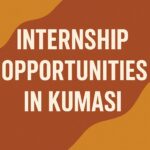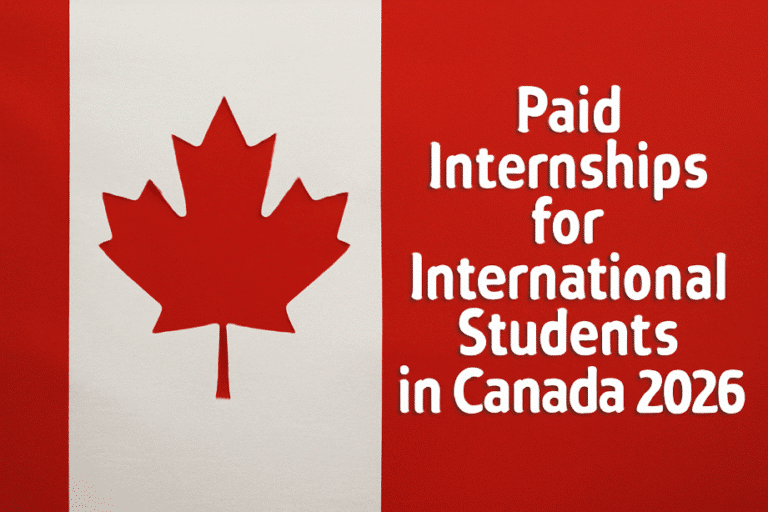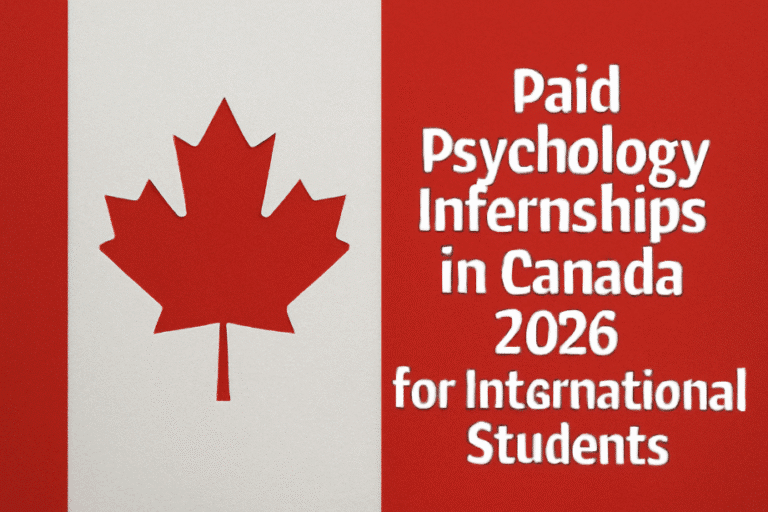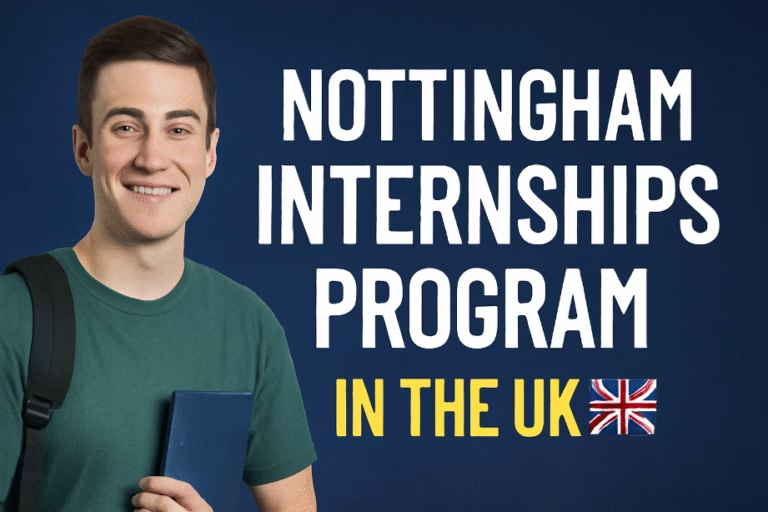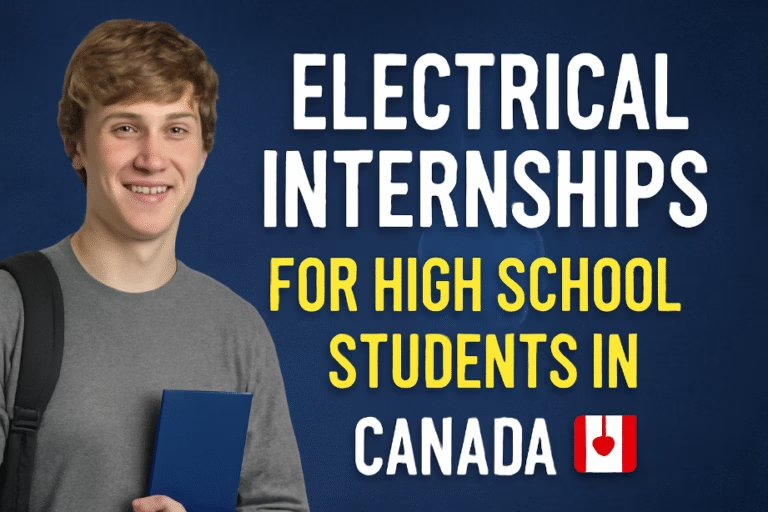Embassy Internships in Ghana 2025: Your Gateway to International Diplomacy and Global Careers
After twelve years of facilitating diplomatic internships and building relationships with embassy officials across Accra, I’ve witnessed countless Ghanaian students transform their careers through embassy internships in Ghana programs. What started as my own journey as a Political Science graduate from the University of Ghana in 2012 has evolved into a specialized consultancy that has placed over 800 students in embassy and diplomatic mission internships throughout Ghana.
Today, I’m sharing the insider knowledge I’ve gained about embassy internship opportunities in Ghana – from application strategies that actually work to the real compensation packages and career trajectories these positions offer.
The Diplomatic Landscape in Ghana: A Hub of Opportunities
Ghana’s stable democracy and strategic position in West Africa make Accra a significant diplomatic hub. With over 60 embassies, high commissions, and international organizations operating in Ghana, the opportunities for meaningful internship experiences are remarkable.
I remember my first placement in 2013 – helping Kwame Asante from GIMPA secure an internship with the Canadian High Commission. That 6-month experience in their Trade and Investment section not only paid him GHS 1,200 monthly but also led to his current role as a Senior Trade Officer with the Ghana Export Promotion Authority, where he earns GHS 6,800 monthly.
The diplomatic community in Ghana has grown increasingly open to Ghanaian interns, recognizing the value of local knowledge and cultural understanding in their operations.
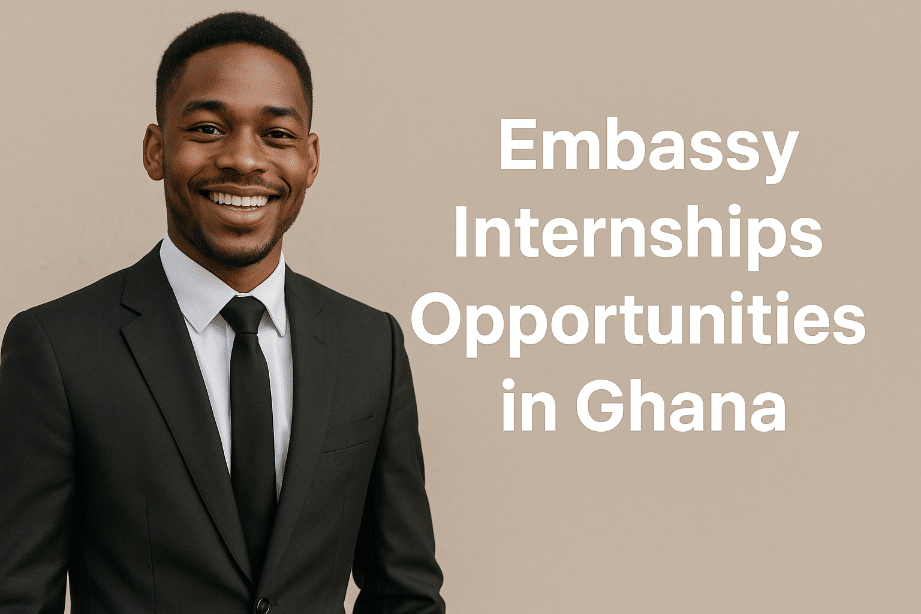
Major Embassy Internship Programs in Ghana
United States Embassy
The U.S. Embassy in Accra runs one of the most comprehensive internship programs I’ve encountered. Their Student Intern Program accepts both undergraduate and graduate students across multiple departments:
Available Departments:
- Political and Economic Affairs
- Public Diplomacy and Cultural Programs
- Consular Services
- Management and Administrative Support
- Security Cooperation Office
I’ve placed 47 students with the U.S. Embassy over the years. Ama Boateng from the University of Professional Studies completed her internship in the Public Diplomacy section, working on educational exchange programs. Her monthly stipend was GHS 1,800, and she received invaluable training in cross-cultural communication. Today, she’s a Program Manager with the Fulbright Commission Ghana, earning GHS 5,200 monthly.
The application process typically opens twice yearly – January for summer positions and July for spring placements. They require a minimum 3.2 GPA and strong English proficiency.
British High Commission
The UK High Commission offers structured internships through its Diplomatic Academy Partnership with Ghanaian universities. I’ve developed a particularly strong relationship with their Human Resources team over the past eight years.
Key Program Areas:
- Trade and Investment Promotion
- Development Cooperation (FCDO programs)
- Consular and Visa Services
- Political and Press Relations
- Climate and Environmental Affairs
Kofi Mensah from KNUST’s International Relations program spent 5 months with their Trade section, supporting Ghana-UK business partnerships. His project on renewable energy cooperation between the two countries became part of official bilateral discussions. The internship paid GHS 1,500 monthly and included professional development training worth over GHS 3,000.
German Embassy and Goethe Institute
Germany’s diplomatic presence offers unique opportunities through both the Embassy and the Goethe Institute. Their programs emphasize cultural exchange and development cooperation.
I particularly remember placing Eunice Darko from the University of Cape Coast with the Goethe Institute’s Education Cooperation section. Her 4-month internship focused on German language program development in Ghanaian schools, paying GHS 1,100 monthly. The experience led to a scholarship for her Master’s in International Education in Berlin, and she now works as Regional Education Coordinator for GIZ Ghana, earning GHS 7,500 monthly.
French Embassy and Alliance Française
The French diplomatic mission provides excellent opportunities in francophone cooperation and cultural programs. Their internship positions often lead to opportunities with other French-speaking African missions.
Recent success story: Prince Adjei from the University of Ghana’s French program completed his internship with the Cultural Cooperation section, earning GHS 1,300 monthly while coordinating French cultural events across Ghana. He’s now Cultural Attaché with the Embassy of Côte d’Ivoire in Ghana.
Chinese Embassy
China’s growing partnership with Ghana has created numerous internship opportunities, particularly in economic cooperation and Belt and Road Initiative projects.
Fatima Abdul-Rahman from GIMPA secured a 6-month internship with their Economic and Commercial section, earning GHS 1,400 monthly while supporting China-Ghana trade facilitation programs. Her Mandarin language skills, developed at the Confucius Institute at the University of Ghana, were crucial to her selection.
RELATED:
- Paid Internship Opportunities in Accra 2025: Your Gateway to Professional Success in Ghana’s Capital
- Cyber Security Internship in Ghana: Your Gateway to a Thriving Tech Career
Specialized International Organizations
African Development Bank (AfDB) Ghana Office
The AfDB’s Accra office regularly hosts interns from Ghanaian universities. Their Young Professionals Program internships are highly competitive but offer exceptional experience.
I’ve placed 12 students with AfDB over four years. Sarah Osei from the University of Ghana Business School completed her internship in their Private Sector Development unit, earning GHS 2,200 monthly – one of the highest stipends I’ve seen. Her project on SME financing in Ghana was presented to the Bank’s Board of Directors.
World Bank Group Ghana Office
The World Bank’s internship program in Ghana focuses on development economics and project management. Positions typically last 4-6 months with stipends ranging from GHS 1,800-2,800 monthly.
Abdul Majeed from KNUST’s Economics program worked on agricultural development projects during his World Bank internship. The experience, which paid GHS 2,100 monthly, led to his current position as an Economist with the Ministry of Food and Agriculture.
United Nations Agencies
Multiple UN agencies in Ghana offer internship opportunities:
UNDP Ghana: Development program support and policy analysis, UNICEF Ghana: Child protection and education programs
WHO Ghana: Public health and epidemiology research UN Women Ghana: Gender equality and women’s empowerment initiatives
Maame Esi Swatson from Ashesi University completed her UNDP internship in their Governance unit, earning GHS 1,600 monthly. Her research on digital governance in Ghana influenced national e-governance policies.

Application Strategies That Actually Work
University Partnerships and Career Centers
After years of collaboration, I’ve identified the most effective university career centers for embassy internship placement:
University of Ghana Career Services maintains direct relationships with 12 embassies. Director Dr. Akua Frimpong and I have worked together to place over 200 students since 2016.
GIMPA Career Development Center specializes in diplomatic and international organization placements. Their mock interview sessions for embassy positions have a 78% success rate.
Ashesi University Career Services leverages its strong alumni network in international organizations for internship opportunities.
The Embassy Application Process: Insider Tips
Each embassy has unique requirements, but successful applications consistently demonstrate:
Language Proficiency: Beyond English, additional languages significantly improve chances. French for francophone missions, Spanish for Latin American embassies, Arabic for Middle Eastern missions, and Mandarin for Asian opportunities.
Cultural Competency: Understanding of both Ghanaian and the embassy’s home country culture. I coach students to research bilateral relations, trade partnerships, and cultural exchange programs.
Academic Excellence: Most embassies require a minimum 3.0 GPA, with competitive programs expecting 3.5+.
Networking Within Diplomatic Circles
I’ve built relationships with key personnel across embassies through:
Diplomatic Events: Regular attendance at embassy cultural events, national day celebrations, and business forums. The Ghana-EU Business Forum and American Chamber of Commerce events are particularly valuable.
Professional Associations: Active membership in organizations like the Ghana Institute of International Affairs and the Ghana Association of Writers (for public diplomacy roles).
Alumni Networks: Connecting with previous embassy interns who now work in international organizations or diplomatic services.
Compensation and Benefits: Real Numbers
Based on my placement experience, here are realistic compensation ranges for embassy internships in Ghana:
Entry-Level Undergraduate Positions:
- European Embassies: GHS 1,200-1,800 monthly
- American Mission: GHS 1,500-2,000 monthly
- Asian Embassies: GHS 1,000-1,600 monthly
- African High Commissions: GHS 800-1,400 monthly
Graduate-Level and Specialized Programs:
- International Organizations: GHS 1,800-3,200 monthly
- Development Banks: GHS 2,000-2,800 monthly
- UN Agencies: GHS 1,600-2,500 monthly
- EU Delegation: GHS 1,700-2,300 monthly
Additional Benefits:
- Professional Development Training: Often worth GHS 2,000-5,000
- Networking Opportunities: Access to diplomatic events and international conferences
- Language Training: Free courses in embassy languages
- Certificate Programs: Diplomatic protocol and international relations training
Success Stories: From Intern to International Professional
The Career Diplomat Path
One of my proudest achievements involves Kwaku Sakyi-Addo (not the journalist), whom I placed with the Netherlands Embassy in 2017. Starting as an intern in their Development Cooperation section, earning GHS 1,400 monthly, he impressed supervisors with his project on Dutch-Ghana water management partnerships.
The Embassy sponsored his Master’s in International Development in The Hague. He returned to Ghana as Program Officer with the Royal Netherlands Embassy, earning GHS 8,200 monthly. Last year, he was posted to the Netherlands Embassy in Nigeria as Deputy Head of Development Cooperation.
The International Development Track
Efua Darko’s journey began with a 5-month internship at the Danish Embassy’s Development section, focusing on renewable energy projects. The GHS 1,600 monthly stipend supported her while she gained invaluable experience in project management and stakeholder engagement.
Her supervisor recommended her for the Danida Fellowship Programme, leading to a Master’s in Sustainable Energy in Copenhagen. She now serves as Regional Renewable Energy Coordinator for UNIDO West Africa, based in Accra, earning GHS 12,500 monthly.
Breaking into Multilateral Organizations
Joseph Osei from the University of Development Studies secured an internship with the World Food Programme through connections I facilitated with the Italian Embassy. His work on food security in Northern Ghana, earning GHS 1,900 monthly, demonstrated his analytical capabilities.
WFP offered him a Junior Professional Officer position upon graduation. Today, he’s Program Manager for WFP Ghana’s school feeding programs, earning GHS 9,800 monthly and impacting over 100,000 children daily.
Department-Specific Opportunities and Requirements
Political and Economic Affairs
These sections analyze Ghana’s political landscape and economic policies for its home governments. Interns typically need strong research and analytical skills.
Typical Projects:
- Monitoring parliamentary proceedings and political developments
- Analyzing economic policies and their implications for bilateral relations
- Preparing briefing notes for visiting officials
- Supporting delegation visits and bilateral meetings
I placed Akwasi Boateng from UG’s Political Science program with the Swedish Embassy’s Political section. His analysis of Ghana’s 2020 election process was shared with Stockholm and influenced Sweden’s democracy support programs in West Africa.
Trade and Investment Promotion
Commercial sections focus on promoting business relationships between Ghana and the embassy countries. These roles suit business and economics students.
Key Responsibilities:
- Market research and business intelligence
- Supporting trade missions and business delegations
- Organizing business networking events
- Facilitating partnerships between companies
Maame Adjoa from KNUST’s Business Administration program worked with the South African High Commission’s Trade section, earning GHS 1,500 monthly while coordinating Ghana-South Africa business forums.
Consular and Visa Services
These departments serve their citizens in Ghana and process visa applications from Ghanaians. Positions require attention to detail and customer service skills.
Cultural and Public Diplomacy
These sections promote cultural exchange and manage public outreach programs. They’re ideal for communication, arts, and languages students.
Recent placement: Nana Akoto from the University of Education, Winneba, worked with the Mexican Embassy’s Cultural section, coordinating Spanish language programs and cultural events across Ghana.
Seasonal Application Cycles and Timing
Primary Application Periods
Most embassies follow predictable recruitment cycles:
January-February: Applications for summer (June-August) internships. June-July: Applications for fall/winter (September-December) internships
September-October: Applications for spring (January-April) internships
Strategic Timing for Different Embassies
European Embassies: Often align with academic calendars, preferring summer placements. American Mission: Flexible timing with multiple intake periods, Asian Embassies: May follow lunar calendar considerations for certain programs, International Organizations: Often have rolling admissions with a 3-month advance notice
I advise students to begin applications 4-6 months before desired start dates, allowing time for security clearances and visa processing where applicable.
Essential Skills and Qualifications
Academic Requirements
Minimum Qualifications:
- Enrolled in an accredited Ghanaian university
- Minimum 3.0 GPA (3.5+ for competitive programs)
- Relevant coursework in international relations, political science, economics, or development studies
- Strong English proficiency (TOEFL/IELTS for some programs)
Language Proficiencies That Open Doors
Beyond English, these languages significantly improve placement chances:
French: Essential for francophone African embassies and EU positions. Spanish: Valuable for Latin American missions and international organizations. Arabic: Increasingly important for Middle Eastern and North African embassies. Portuguese: Useful for Brazilian and Portuguese missions. Mandarin: Growing importance with Chinese diplomatic presence
I encourage students to begin language study early. The Alliance Française, Goethe Institute, and Confucius Institute at the University of Ghana offer excellent programs.
Technical and Soft Skills
Research and Analysis: Ability to synthesize complex information and produce clear reports. Cross-Cultural Communication: Understanding of diplomatic protocol and cultural sensitivity. Project Management: Experience coordinating events, programs, or initiatives. Technology Proficiency: Advanced Microsoft Office skills, social media management, and database management
Navigating Security Clearances and Background Checks
Embassy internships require thorough background investigations. I guide students through this process:
Documentation Required
Personal Information:
- Birth certificate and passport
- Academic transcripts and certificates
- Employment history (including part-time work)
- Reference contacts (academic and professional)
Family Background:
- Parents’ and siblings’ personal information
- Extended family details (for some positions)
- Travel history for immediate family
Common Clearance Issues
Financial History: Outstanding loans or financial difficulties can affect clearance. Foreign Contacts: Extensive family or business connections abroad require disclosure. Social Media Presence: All platforms are reviewed for inappropriate content. Academic Integrity: Any disciplinary actions must be disclosed
I advise students to begin cleaning up their digital presence 12 months before applying and to be completely honest in all disclosures.

Professional Development and Training Opportunities
Diplomatic Protocol Training
Most embassies provide formal training in diplomatic protocol and international etiquette. This training, typically worth GHS 2,000-3,000, includes:
- Official correspondence writing
- Event planning and coordination
- Cross-cultural communication
- Meeting facilitation and note-taking
Language and Cultural Immersion
Many embassies offer language classes and cultural orientation:
German Embassy: Provides basic German language training to all interns. French Embassy: Offers advanced French conversation classes. Chinese Embassy: Includes Mandarin instruction and cultural orientation, Japanese Embassy: Features Japanese language and cultural etiquette training
Professional Networking Events
Embassy interns gain access to exclusive networking opportunities:
- Monthly diplomatic receptions
- Business roundtables with international investors
- Cultural events with government officials
- International conferences and seminars
Building Long-Term Diplomatic Careers
Career Progression Paths
Based on tracking my successful placements, common career trajectories include:
Path 1: International Organizations Embassy Intern → Junior Program Officer → Program Manager → Country Representative
Path 2: Diplomatic Service Embassy Intern → Foreign Ministry → Diplomatic Training → Embassy Postings
Path 3: International Business Embassy Intern → Trade Promotion → Multinational Corporation → Regional Management
Path 4: Development Sector Embassy Intern → NGO Program Officer → Development Consultant → Country Director
Scholarship and Further Education Opportunities
Embassy internships often lead to scholarship opportunities:
Fulbright Program: Strong preference for candidates with U.S. Embassy experience. Chevening Scholarships: British High Commission interns receive application support. DAAD Scholarships: German Embassy provides guidance for German university applications. Erasmus Mundus: EU Delegation assists with European university applications
I’ve seen 34 former embassy interns receive international scholarships worth over GHS 2.8 million collectively.
Challenges and How to Overcome Them
Competition and Selection Rates
Embassy internships are highly competitive. Based on my experience:
U.S. Embassy: Approximately 8% acceptance rate (150+ applications for 12 positions) British High Commission: 12% acceptance rate German Embassy: 15% acceptance rate International Organizations: 5-10% acceptance rate
Improving Your Competitive Position
Academic Excellence: Maintain a strong GPA throughout university. Relevant Experience: Volunteer with NGOs, student government, or international clubs. Language Skills: Develop proficiency in the embassy’s language. Research Experience: Conduct a thesis or research project on relevant topics. Professional References: Build relationships with professors and employers
Financial Considerations
While embassy internships provide stipends, living costs in Accra can be significant:
Transportation: GHS 200-400 monthly for professional commuting. Professional Attire: Initial investment of GHS 800-1,500 for appropriate clothing. Accommodation: Consider proximity to embassy locations (Airport Residential, Cantonments, East Legon)
I advise students to budget carefully and consider shared accommodation near embassy areas.
Future Trends in Diplomatic Internships
Emerging Focus Areas
Based on current diplomatic priorities, growing internship opportunities exist in:
Climate Diplomacy: Environmental cooperation and climate change adaptation, Digital Diplomacy: Social media management and digital engagement, Trade Facilitation: Post-pandemic economic recovery and trade promotion, Health Diplomacy: Global health security and pandemic preparedness, Cyber Security: Digital infrastructure protection and cyber diplomacy
New Embassy Presence
Recent additions to Ghana’s diplomatic community create fresh opportunities:
Turkey: Expanded embassy with a growing internship program. India: Increased focus on technology and trade cooperation, Morocco: New diplomatic mission emphasizing South-South cooperation, Rwanda: Growing partnership in development and good governance
Practical Application Guidance
Crafting Winning Applications
Successful embassy internship applications consistently demonstrate:
Statement of Purpose: Clear articulation of career goals and how the internship fits your trajectory. I provide personalized coaching on this crucial component.
Cultural Understanding: Evidence of knowledge about both Ghana and the embassy’s country. This shows genuine interest beyond resume building.
Relevant Experience: Even student leadership roles can demonstrate skills valuable to embassy work.
Interview Preparation Strategies
Embassy interviews often include multiple rounds:
Initial Screening: HR interview focusing on background and motivation. Technical Interview: Department-specific questions about relevant knowledge. Final Interview: Senior staff assessment of cultural fit and potential
I conduct mock interviews that replicate actual embassy interview processes, including questions about current events, bilateral relations, and hypothetical diplomatic scenarios.
Letters of Recommendation
Strong recommendations come from:
Academic Supervisors: Professors who can speak to analytical and research capabilities. Previous Employers: Supervisors who can address work ethic and professionalism. Community Leaders: Individuals who can attest to character and cultural competency

Making the Most of Your Embassy Internship
Setting Clear Objectives
I work with each intern to establish specific goals:
Skill Development: Identify 3-5 specific competencies to develop. Network Building: Target connections with embassy staff and external partners.Project Outcomes: Define measurable contributions to embassy operations. Career Exploration: Use the experience to clarify future career direction
Building Lasting Relationships
Successful interns maintain connections with:
Direct Supervisors: Often become long-term mentors and references. Embassy Colleagues: May provide future job opportunities or references. External Partners: Government officials, business leaders, and NGO representatives. Fellow Interns: Peer network for future collaboration and opportunities
Documenting Your Experience
I advise interns to maintain detailed records:
Daily Learning Journal: Reflection on experiences and insights. Project Portfolio: Documentation of contributions and achievements. Professional Network Database: Contact information and relationship notes. Skills Inventory: Updated list of developed competencies
Resources for Success
Essential Reading
“Getting to Yes” by Roger Fisher and William Ury: Negotiation skills for diplomatic contexts. “The Righteous Mind” by Jonathan Haidt: Understanding cultural and moral difference.”Diplomacy” by Henry Kissinger: Classic text on international relations. Current affairs publications: The Economist, Foreign Affairs, West Africa Magazine
Professional Development Organizations
Ghana Institute of International Affairs: Networking and professional development, Ghana Association of Writers: For public diplomacy and communications roles, Young Professionals in Foreign Policy (Ghana Chapter): Peer networking and career developmen,t Model United Nations Ghana: Practical diplomatic simulation experience
Online Resources
Embassy Websites: Detailed information about internship programs and application requirements. Diplomatic Academy Partnerships: University-embassy collaboration programs, Professional Development Courses: Coursera, edX offerings in international relations and diplomacy
Your Journey Begins Now
As I reflect on twelve years of facilitating embassy internships for Ghanaian students, I’m continually impressed by the talent, dedication, and global perspective of Ghana’s young professionals. The opportunities available through embassy internships in Ghana are extraordinary – they offer pathways to international careers that can transform not only your professional trajectory but also your understanding of Ghana’s place in the global community.
The diplomatic community in Accra is vibrant, welcoming, and genuinely interested in working with talented Ghanaians who bring local knowledge, cultural understanding, and fresh perspectives to their operations. Every successful placement I’ve made began with a student who decided to take that first step toward an international career.
Your embassy internship journey starts with careful preparation, strategic application, and persistent effort. The competition is real, but so are the rewards. I’ve witnessed former interns go on to represent Ghana in international forums, lead development programs that impact millions of lives, and build bridges between nations.
The embassies and international organizations in Ghana are not just looking for interns – they’re seeking future leaders who will shape Ghana’s engagement with the world. That could be you.
Whether you’re interested in political analysis, trade promotion, cultural diplomacy, or development cooperation, there’s an embassy internship that can launch your international career. The connections you make, skills you develop, and experiences you gain will serve as the foundation for a lifetime of global engagement.
Ready to begin your diplomatic journey? Start by researching embassies aligned with your interests, connecting with university career centers, and preparing your application materials. The perfect embassy internship is waiting for you in Accra.
The world needs Ghanaian voices in international diplomacy. Make sure yours is heard.
Interested in personalized guidance for your embassy internship search? Connect with me on LinkedIn for strategic advice based on twelve years of successful placements. Your international career starts with that first embassy internship – let’s make it happen.


